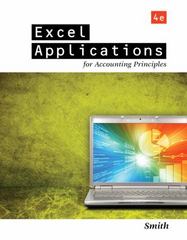Question
Green Thumb Lawn Maintenance - Cost Classification Linda Larose is a graduate student at Laurentian University enrolled in the Master of Business Administration (MBA) program
Green Thumb Lawn Maintenance - Cost Classification
Linda Larose is a graduate student at Laurentian University enrolled in the Master of Business Administration (MBA) program commencing in the fall of 2021.Linda has a strong entrepreneurial interest and upon graduation would like to start her own full-time business.In the summer of 2021 Linda decided to start a part-time business of providing lawn care maintenance to home owners in her home town of London, Ontario. She called the business Green Thumb Lawn Maintenance. Linda would focus on two areas in London both of which had large homes with big lawns. In addition to providing income to support her MBA studies, Linda saw this as a great form of outdoor exercise. In the previous two summers Linda had worked at a well known and popular coffee shop in downtown London. She was able to work full-time (35 hours per week) at the coffee shop during the months of May to August (16 weeks) at a rate of $15/hour.
In March of 2021, Linda began to formulate her business plan. Green Thumb Lawn Maintenance would focus on lawn cutting services. Linda realized there would be some up front cash outlays associated with the business including the following costs:
- $200 in business registration fees (valid for five years)
- Purchase of a used lawn mower and cleaning tools - $250 (the lawn mower had an expected life of three years)
- Advertising flyers - $300
- Liability insurance - Three-year policy paid up front - $330
Certain start-up costs were funded by borrowings ($500 in total) from Linda's parents at zero interest and a promise to pay her parent's back at the end of the summer.
Linda' revenue plan called for a flat rate of $25 for each lawn cut but if a customer signed up for her service for the entire summer then Linda would offer a discounted rate of $80/month based on four grass cutting visits per month. The discounted rate proved popular since by the end of May 2021, Linda had 35 customers signed up.
Linda's sister, Karen, while not an accountant was a meticulous record keeper and agreed, at no cost, to keep the "books" for Green Thumb Lawn Maintenance. Karen kept detailed records including customer information (names addresses, contact information, date and time of service) and billings and payments.
The summer of 2021 was a particularly wet summer and grass grew quickly. On average, Linda worked five days a week, with four to six customer visits per day. Most of her time (80%) was spent cutting lawns with about 20% of her time reviewing operations with Karen.
Linda has her own vehicle and drives to each customer's house to cut their lawn.Usually the drive is short, 10-15 minutes. Linda kept all receipts for the purchase of gas for both the car and the lawn mower. Linda used $1,000 in gas for the car during the summer of 2021 of which 20% was related to the business.
In September of 2021, after the business had finished operations for the summer, Linda and Karen got together to prepare an Income Statement for the period May 1 to August 31, 2021 (Exhibit 1). The Income Statement did not include the $500 loan repayment Linda promised to her parents at the end of the summer.
Exhibit 1
Green Thumb Lawn Maintenance
Income Statement
For the Period May 1 to August 31, 2021
Revenue: $11,000
Expenses:
Gas for lawn mower $ 700
Gas for Linda's car 1,000
Lawn mower purchase 300
Business registration 200
Insurance 330
Advertising 300
Linda's wages 8,500
Total Expenses $11,330
Operating Income/(loss) $(330)
Linda thought the business would turn a profit and was disappointed with the operating loss. She therefore was considering whether it would be worthwhile to continue the business in the summer of 2022 or return to work at the coffee shop. Linda had a great summer of exercise and outdoor work and had extremely satisfied customers. If Linda were to wind down the business the money she spent on the five-year business registration, the three-year insurance policy, and the equipment would be wasted in her view.
Required:
Help Linda evaluate the business. Prepare a qualitative (pros and cons of running the business) and a quantitative analysis. In your review consider re-visiting the Income Statement (Exhibit 1) and comment on the classification of costs. Prepare an Income Statement that better reflects the classification of costs if you feel the current Income Statement has inaccuracies. Recommend to Linda how she should proceed.
Step by Step Solution
There are 3 Steps involved in it
Step: 1

Get Instant Access to Expert-Tailored Solutions
See step-by-step solutions with expert insights and AI powered tools for academic success
Step: 2

Step: 3

Ace Your Homework with AI
Get the answers you need in no time with our AI-driven, step-by-step assistance
Get Started


